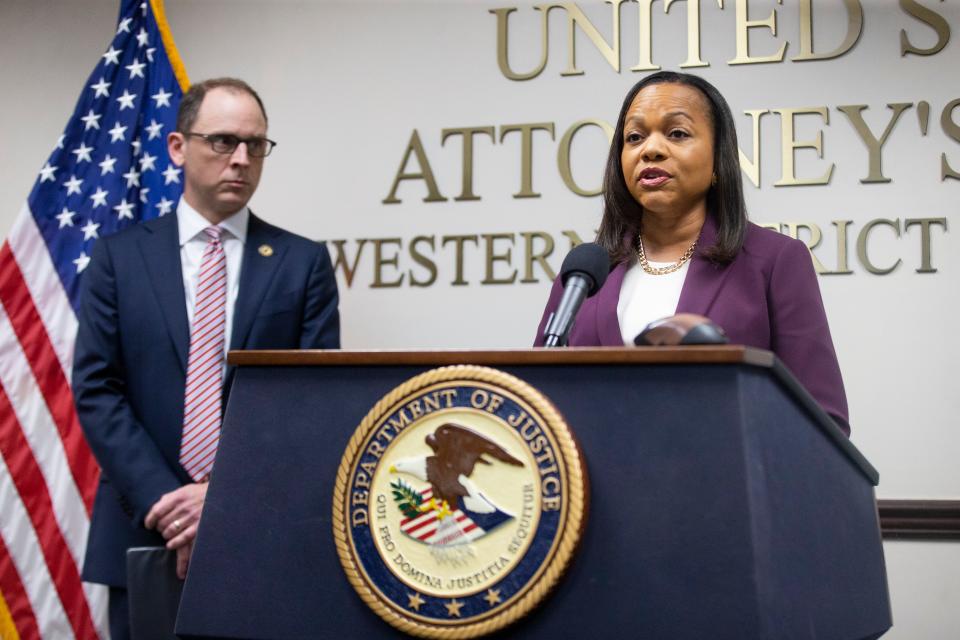DOJ sues Tennessee over aggravated prostitution law, citing discrimination for those with HIV

Editor's note: This story has been updated to clarify the changes proposed legislation about the aggravated prostitution law would make.
The U.S. Department of Justice has sued the State of Tennessee and the Tennessee Bureau of Investigation over the state’s enforcement of its aggravated prostitution law.
The suit, filed in the U.S. District Court for the Western District of Tennessee Thursday, comes over two months after the DOJ said the law is discriminatory against people living with HIV and that it violates the Americans with Disabilities Act.
“The enforcement of state criminal laws that treat people differently based on HIV status alone and that are not based on actual risks of harm, discriminate against people living with HIV,” said Assistant Attorney General Kristen Clarke of the Justice Department’s Civil Rights Division in a press release. “People living with HIV should not be subjected to a different system of justice based on outdated science and misguided assumptions. This lawsuit reflects the Justice Department’s commitment to ensuring that people living with HIV are not targeted because of their disability.”
It also follows a federal lawsuit filed by multiple organizations — including the American Civil Liberties Union, the Transgender Law Center and the ACLU of Tennessee — on behalf of four “Jane Doe” plaintiffs and OUTMemphis, a local nonprofit that serves the LGBTQ community.
Someone convicted of aggravated prostitution, a Class C felony, in Tennessee faces between three and 15 years in prison and a fine of up to $10,000. The DOJ said a person convicted of a misdemeanor for the same conduct would be sentenced to six months or less in prison and given a $500 fine.

“Defendants unlawfully discriminate against individuals with human immunodeficiency virus (HIV), a disability, in their maintenance and enforcement of Tennessee’s aggravated prostitution statute… which is a felony office,” the DOJ wrote in the lawsuit. “This law subjects people living with HIV to harsher criminal penalties for engaging in prostitution, a misdemeanor offense, because of their HIV status and regardless of any actual risk of harm. Tennessee law also categorizes aggravated prostitution as a ‘violent sexual offense,’ mandating registration on the Tennessee Sex Offender Registry, typically for life.”
The lawsuit specifically cites Memphis and Shelby County’s enforcement of the law, pointing to the Memphis Police Department’s Organized Crime Unit conducting “decoy operations” to enforce prostitution laws. It also said that most of the people solely on the sex offender registry for aggravated prostitution were convicted by the Shelby County District Attorney’s Office.
“Individuals are often given a ‘suspended’ sentence which allows them to be put on probation first,” the lawsuit continued. “In many cases, DA’s offices will pursue a petition to revoke suspended sentences if the individual violates the terms of their probation (including for failure to comply with sex offender registration requirements or to possess required identification). As a result of either their initial convictions or these revocations, individuals convicted of aggravated prostitution often end up serving time in jail or prison, including in state-operated facilities.”
More: Legislative measures targeting bail processes in Tennessee move forward. What happens next
In pointing to the law’s overly broad nature, the DOJ said “more than half of people diagnosed with HIV were virally suppressed,” meaning it is essentially impossible for them to transmit the virus.
The DOJ requests in the lawsuit that a judge order the state to stop enforcing its aggravated prostitution law and to have anyone on the sex offender registry solely for a conviction under that law be removed and the records be expunged.
It also requested that one person mentioned in the lawsuit, and “other aggrieved individuals” be awarded compensatory damages for being convicted under the law including registry fees, court costs and fines, bonds and attorney’s fees.
The Tennessee Senate on Feb. 5 passed a bill that would remove requirements to register as a sex offender if convicted and provide a pathway to expungement for those convicted. The bill has bipartisan support and is up for a full vote in the House on Feb. 22. The bill was originally introduced as a complete repeal of the aggravated rape law, but was amended to keep the law in Tennessee's criminal code.
Another bill introduced by Rep. Torrey Harris, D-Memphis, and state Sen. Jeff Yarbro, D-Nashville, at the start of the legislative session would remove the law from the books if passed.
Lucas Finton is a criminal justice reporter with The Commercial Appeal. He can be reached at Lucas.Finton@commercialappeal.com, or (901)208-3922, and followed on X, formerly known as Twitter, @LucasFinton.
This article originally appeared on Memphis Commercial Appeal: Tennessee sued by Department of Justice for aggravated prostitution law

